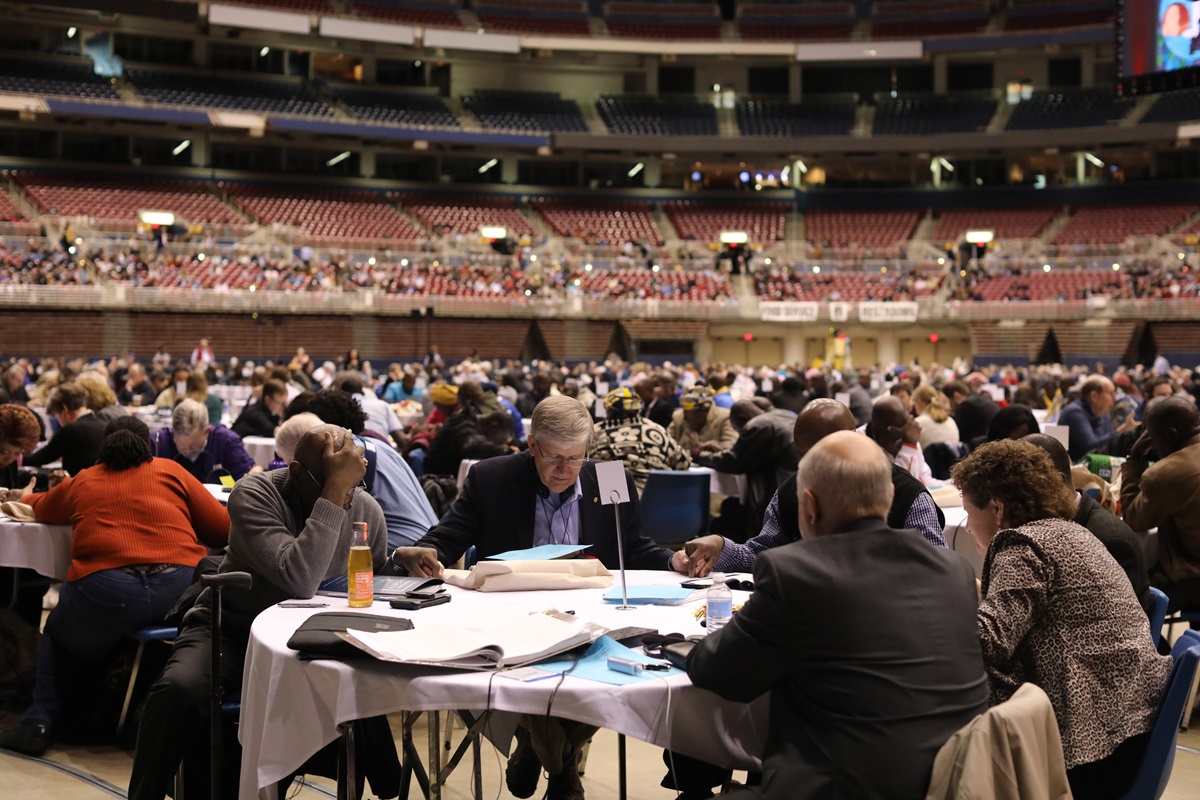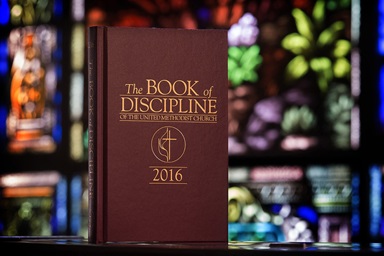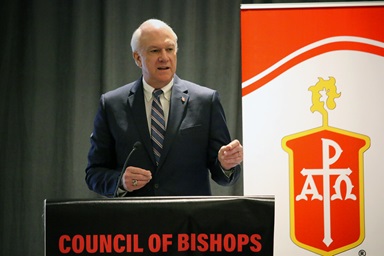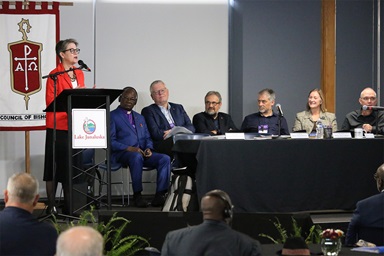Headline-making decisions by the legislative body of The United Methodist Church will be reviewed next month by the denomination’s top court.
The United Methodist Judicial Council has posted its two-item docket for the April 23-26 meeting in Evanston, Illinois, with a reminder of deadlines for request for oral hearings and brief submissions.
As the special General Conference drew to a close on Feb. 26, delegates approved a request that the top court review the Traditional Plan as amended. That plan would strengthen enforcement to prevent “self-avowed practicing homosexuals” from serving as clergy and would impose mandatory penalties on clergy who officiate at same-sex weddings.
During a Feb. 27 closed meeting following General Conference, the Council of Bishops decided to ask the Judicial Council to make a declaratory decision on the constitutionality of Petition 90066, also adopted by GC2019. The petition outlines procedures for local churches to disaffiliate from the denomination and retain property.
This will not be the first time the Judicial Council has ruled on the legislation in question.
When the court met last October, it reviewed two of the plans — the Traditional Plan and the One Church Plan — that would come before General Conference 2019. In Decision 1366, the court found seven petitions and parts of two others unconstitutional in the 17 implementing petitions of the Traditional Plan.
The October ruling mainly focused on due process and the principle of legality. That principle “means that all individuals and entities are equally bound by church law,” the decision said, and the law was to be applied fairly at all levels of the connection.
On the morning of Feb. 26, before GC2019 ended, the Judicial Council again ruled on the Traditional Plan’s petitions — along with two “exit plans” for disaffiliation from the denomination — following a request from the General Conference legislative committee. In Decision 1377, the court deemed nine petitions unconstitutional and one other petition partially unconstitutional.
In addition to disaffiliation, those petitions dealt with subjects such as episcopal accountability and responsibilities, composition of boards of ordained ministry and the examination of candidates for ministry by the boards of ordained ministry.
Legislative tracking of the Traditional Plan petitions flagged again by Judicial Council during the February General Conference shows that Petitions 90033, 90034, 90035 and 90037 were amended before being adopted.
Petition 90033 allows a voting majority of the Council of Bishops to retire a bishop “with or without their consent” and Petition 90034 allows a voting majority of the council to put any bishop in “involuntary leave status.” Petition 90035 establishes a “council relations committee” for the Council of Bishops in order to hold individual bishops accountable.
Petition 90037, on nominees for conference boards of ordained ministry, stipulates that the nominees must certify their intent to uphold, enforce and maintain the Book of Discipline related to ordination and marriage of self-avowed practicing homosexuals and that the bishops must certify they have nominated such individuals.
Three other petitions found unconstitutional by Judicial Council — 90038, 90039 and 90040 —were adopted by GC2019 as originally submitted.
Petition 90038 says the conference board of ordained ministry must examine whether a ministry candidate is practicing homosexual. Petition 90039 requires the annual conference to certify that a bishop made proper nominations of ministry candidates, and Petition 90040 requires conference certification that a bishop only nominated members to serve on the ordained ministry board who will enforce disciplinary prohibitions against homosexuality.
Judicial Council also had found unconstitutional a sentence of Petition 90045, which focuses on the just resolution process. GC2019 delegates rejected Petition 90059, a disaffiliation plan cited earlier as unconstitutional by Judicial Council.
Petition 90066, also considered in Decision 1377, would create a new paragraph, 2553, at the end of the chapter on church property in the Book of Discipline, allowing local churches “to disaffiliate from the denomination for reasons of conscience …” if there was a change in church law over issues of homosexuality.
But the petition sidesteps mandatory annual conference ratification, a constitutional requirement through Paragraph 33, the Judicial Council ruled. “If an annual conference is to play a vital role in planting new churches and ministries, it must also be given a role in the disaffiliation process of local churches within its boundaries,” Decision 1377 said.
A dissent from Decision 1377 by three council members — found at the bottom of the decision on the court’s website — calls that sentence “a statement of policy which seeks to legislate for the General Conference” that is not grounded in disciplinary language.
As the Council of Bishops points out in its petition for a declaratory decision, Petition 90066 was amended by General Conference on Feb. 26 after it approved the substitution of a minority report presented by the Rev. Beth Ann Cook, an Indiana Conference delegate.
But adopting the minority report “does not cure the constitutional problem with the petition,” the bishops argue in their request. “There still is no requirement that the decision of the local church be ratified by the annual conference.”
The bishops also point out that “there was no change in the Book of Discipline at the 2019 General Conference regarding the practice of homosexuality or the ordination or marriage of self-avowed practicing homosexuals.”
Without such a change, the council said it believes “a local church may not implement the provisions of the petition” and never could since the petition is tied to actions of a specific General Conference that is now concluded.
Bloom is the assistant news editor for United Methodist News Service and is based in New York.
Follow her at https://twitter.com/umcscribe or contact her at 615-742-5470 or newsdesk@umnews.org. To read more United Methodist news, subscribe to the free Daily or Weekly Digests.
Like what you're reading? Support the ministry of UM News! Your support ensures the latest denominational news, dynamic stories and informative articles will continue to connect our global community. Make a tax-deductible donation at ResourceUMC.org/GiveUMCom.




